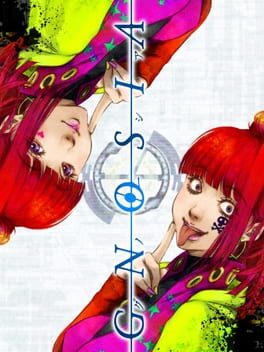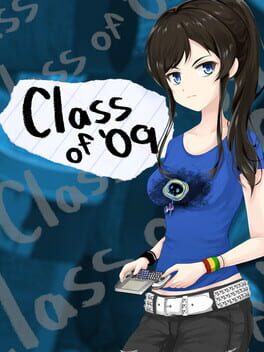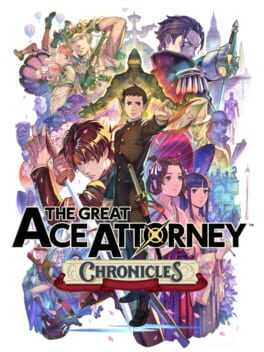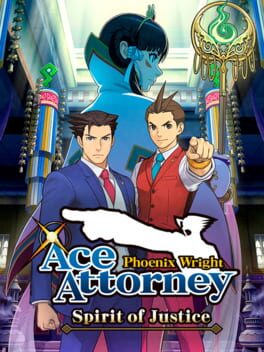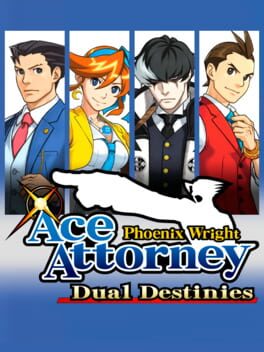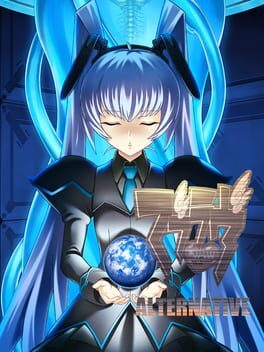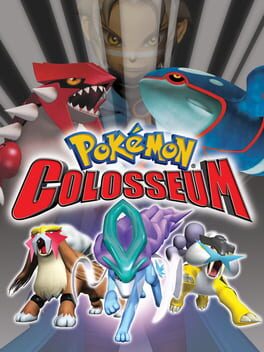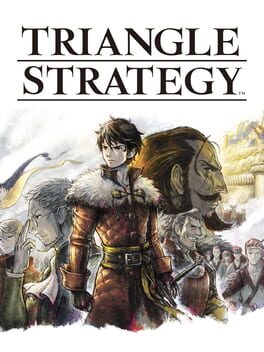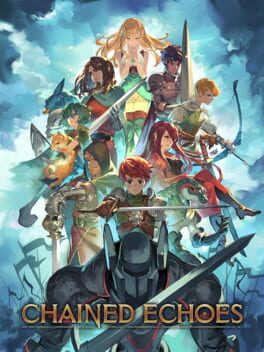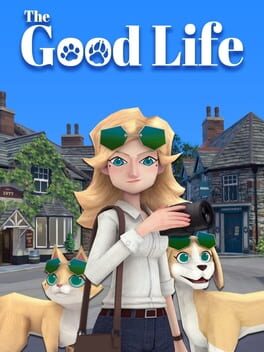falsenine
53 Reviews liked by falsenine
Gnosia
2019
Class of '09
2021
Playing the OG after Re-Up is a funny thing. Nicole is more vulnerable, everyone is viler, and the humor is 'good' instead of 'holy shit my sides are obliterated'. I will say that the tone is darker, with many more bad endings than good ones: my favorite is the one where perjury lands you a life of luxury. My primary issue lies with the autoplay and ren'py in general - the dialogue wasn't synced up to the audio as often as I would have liked, and error screens were definitely more common than in Re-Up. Technical limitations aside, the voice acting was incredibly strong with Max Field as Kylar putting in one hell of a performance. Guy had that douchebag cadence locked down. It's commendable how the game goes full in on how miserable high school is while being absurd as shit all the while.
So yeah, it's a roughly hewn comedy with plenty of edge. I think it's alright.
By the way, if you dislike this game you're a fucking racist chud.
So yeah, it's a roughly hewn comedy with plenty of edge. I think it's alright.
By the way, if you dislike this game you're a fucking racist chud.
Final Fantasy IX
2000
For followers of the Ace Attorney franchise, Dai Gyakuten Saiban appeared to be an unattainable mirage. Released in 2015 and never localised, the title was a distant beacon that players were desperately trying to experience. The situation had already happened in the past with Gyakuten Kenji 2 (2011). The game was a follow-up to the first spin-off which already featured Miles Edgeworth. In that case, the combination of the disappointing sales of the first opus and the impossibility of splitting the localisation team on both Gyakuten Kenji 2 and the upcoming Dual Destinies (2013) prevented the game from being released outside Japan. The Ace Attorney community being tenacious, they set about an unofficial translation, the quality of which must be underlined for amateur work. Thus, it was the Scarlet Study team that took on the unofficial translation of Dai Gyakuten Saiban, shortly after a playthrough with English subtitles was released online.
A titanic task if ever there was one. This fan localisation also shines through in its tendency towards professionalism and was well on its way to completing the entirety of the two games released, before leaks took the public by surprise, announcing the official localisation in a single collection, The Great Ace Attorney Chronicles. The following months would confirm these rumours and the localisation was carried out by Janet Hsu, whose challenge here is particular. Unlike the main series, for which the localisation embraced an Americanisation of all Japanese place names and cultural markers, The Great Ace Attorney only makes sense by respecting the spirit and letter of the terms used.
Indeed, the title places us in the shoes of Ryunosuke Naruhodo, ancestor of Phoenix Wright, and young Japanese student. His adventures will lead him to become a defence lawyer and to cross the globe to settle in the Victorian United Kingdom, with Herlock Sholmes. He is accompanied by Susato Mikotoba, a legal assistant caught in the conservative fire of legal institutions. This historical context is the cornerstone of the title's social and political discourse, as well as the narrative economy, so that it is impossible to transpose Meiji era Japan to a fantasy creation that copies the United States. This historical stability thus brings an element of complexity, since it is a question of translating dialogues, but also a continuum of reactions – drawn from reality – that underlie behaviours at the turn of the 20th century.
It would be difficult for me to set out here all the issues related to translation, as they are so rich and plural. Nevertheless, I would like to insist briefly on the ability to transcribe strangeness in the official localisation, something that is lacking in the fan localisation. Indeed, for a Western audience – especially if they are familiar with the mysteries of the Golden Age of Detective Fiction – the Victorian spirit should not be too disorienting. For our protagonists, the situation is quite different, and conveying this impression of surprise and novelty is a difficult operation, when all the text is in English. Susato and Ryunosuke use idioms and comparisons with Japanese elements to express their perplexity and it is the translation of such elements that is the great challenge of the localisation. For more on this, I can only recommend the extremely interesting blog posts by Janet Hsu.
But what about the game itself? I'm not ashamed to say that the title has quickly become one of my favourite games, crowning an exceptional franchise in my opinion. The Ace Attorney formula is generally well known: a succession of four or five cases, in which our protagonist alternates between investigation and trial sequences. In the former, the gameplay is close to traditional point&clicks, in a tradition that may remind us of The Portopia Serial Murder Case (1983) and all the games that follow. The trial phases are visual novels with cross-examination sequences where the aim is essentially to dismantle the testimonies by pointing out the contradictions they have with the case file. If the formula has always worked well, it must be said that certain recurrent criticisms point to the length of the investigation phases and a certain artificiality in the rhythm of the cases. I agree with them overall and was very surprised to see that The Great Ace Attorney Chronicles sweeps away these problems with exceptional ease.
For the first five cases, the pace is impeccably supported by a single investigative sequence, followed by the trial court portion. Even when the traditional formula returns for the last four cases, the pace is judiciously thought out, thanks to an elegant tangle of narrative threads. Indeed, in the vein of Gyakuten Kenji, The Great Ace Attorney has several overarching mysteries, within which are nestled smaller mysteries, solved with each case. This matriochka structure keeps the dramatic tension high and highlights the corruption that permeates the British Empire and its Japanese counterpart.
The Great Ace Attorney is a far cry from Apollo Justice and does not omit the political aspect in its criticism of the judicial system. This was very bland in the main series with a dark age of the law that had no formal consequences, so it was more of a background that awkwardly justified Phoenix Wright's suspension. Here, the corruption is felt in the gameplay from the third case onwards, and it persists throughout the rest of the game, through subtly revolting elements that challenge Ryunosuke and Susato's certainties.
In general, all the elements, beyond their comic and narrative strengths, aim to highlight structural problems in British and Japanese society, indirectly shedding light on very contemporary concerns. The plunge into Victorian London for Japanese students is highlighted by the main cast, but also the figure of Natsume Souseki, whose restlessness helps to convey the difficulty of adapting to a decidedly foreign society. The insistence on taxes points to the horror of the British social classes, in contrast to the aristocratic image that some characters give off – van Zieks, but more generally the entire judicial institution. Whether in the third, fifth, seventh or eighth case, The Great Ace Attorney is careful to highlight the problem of science at a time when a methodical revolution is taking place. The birth of forensic science and forensics allows the title to discuss what science is and what it can do.
For the game takes up the character of Sherlock Holmes – here localised as Herlock Sholmes, as Maurice Leblanc did in his time – but all the themes that are addressed in the Doylian stories. Shu Takumi shows a remarkable love for the Holmesian canon, reinterpreting and blending iconic investigations into his own universe, as well as classic detective fiction, as references abound and there are more or less sustained tributes to Ellery Queen and John Dickson Carr, Edogawa Rampo and Gilbert Keith Chesterton. I would have loved to go into more detail about these references, but that would require a full explanation of the cases, and I prefer to leave the pleasure of discovery to the reader. In any case, lovers of classic detective stories can only be seduced by Shu Takumi's approach, which offers an exceptional recital on well-known themes and tropes.
Finally, a word on the technical achievement. If Ace Attorney has always been known for its exceptional sprite work and impeccable staging – thanks to a remarkable sound effects job – The Great Ace Attorney raises the discipline to the best of the franchise. The animations are exceptionally beautiful and the sense of timing is always perfect. While the first five cases use some animated scenes in its cinematics, the last five are content to use the game's engine, but there is no room for reproach, as the composition is so well mastered.
In this respect, the musical work is undoubtedly the best in the series, with a subtle play in the instrumentation, which marries Western orchestras with Japanese influences and instruments – in a way that also recalls the work of Yu-Peng Chen on Genshin Impact. On a personal note, The Great Ace Attorney has my favourite soundtrack of the entire franchise, for the enveloping nature of the tracks and its solemnity, which I particularly enjoy. The dubbing is not to be outdone, as it suits the characters perfectly; in particular, the fact that the actors for the Japanese students are British dubbers of Japanese descent – thus Mark Ota, Rina Takasaki and Ben Deery – contributes to the overall atmosphere.
I could go on and on about the characters being some of the funniest in the franchise and the sincerity that emanates from the game, but what can I say except that they contribute to one of my most cherished video game experiences? I've always had a foreign fascination with the late 19th century and pre-war era. To see characters evolve in this setting, in their fortunes and misfortunes, has been a source of exceptional joy.
No doubt the fact that I shared this experience with my parents – in that respect, how perfect is the Ace Attorney franchise for introducing newcomers to video games! – makes it special. But few games, in any case, are able to take me from tears to laughter in a matter of moments. It's a title that makes no concessions on its themes, on its political discourse, and that remains exceptionally sweet, with a high level of humanity. John Watson, in the Holmesian canon, observed of Mary Marson: "A wondrous subtle thing is love, for here were we two, who had never seen each other before that day, between whom no word or even look of affection had ever passed, and yet now in an hour of trouble our hands instinctively sought for each other... So we stood hand in hand like two children, and there was peace in our hearts for all the dark things that surrounded us." The atmosphere in this quote is the feeling that The Great Ace Attorney evokes in my heart, when I think of it again. A masterwork, without any doubt.
A titanic task if ever there was one. This fan localisation also shines through in its tendency towards professionalism and was well on its way to completing the entirety of the two games released, before leaks took the public by surprise, announcing the official localisation in a single collection, The Great Ace Attorney Chronicles. The following months would confirm these rumours and the localisation was carried out by Janet Hsu, whose challenge here is particular. Unlike the main series, for which the localisation embraced an Americanisation of all Japanese place names and cultural markers, The Great Ace Attorney only makes sense by respecting the spirit and letter of the terms used.
Indeed, the title places us in the shoes of Ryunosuke Naruhodo, ancestor of Phoenix Wright, and young Japanese student. His adventures will lead him to become a defence lawyer and to cross the globe to settle in the Victorian United Kingdom, with Herlock Sholmes. He is accompanied by Susato Mikotoba, a legal assistant caught in the conservative fire of legal institutions. This historical context is the cornerstone of the title's social and political discourse, as well as the narrative economy, so that it is impossible to transpose Meiji era Japan to a fantasy creation that copies the United States. This historical stability thus brings an element of complexity, since it is a question of translating dialogues, but also a continuum of reactions – drawn from reality – that underlie behaviours at the turn of the 20th century.
It would be difficult for me to set out here all the issues related to translation, as they are so rich and plural. Nevertheless, I would like to insist briefly on the ability to transcribe strangeness in the official localisation, something that is lacking in the fan localisation. Indeed, for a Western audience – especially if they are familiar with the mysteries of the Golden Age of Detective Fiction – the Victorian spirit should not be too disorienting. For our protagonists, the situation is quite different, and conveying this impression of surprise and novelty is a difficult operation, when all the text is in English. Susato and Ryunosuke use idioms and comparisons with Japanese elements to express their perplexity and it is the translation of such elements that is the great challenge of the localisation. For more on this, I can only recommend the extremely interesting blog posts by Janet Hsu.
But what about the game itself? I'm not ashamed to say that the title has quickly become one of my favourite games, crowning an exceptional franchise in my opinion. The Ace Attorney formula is generally well known: a succession of four or five cases, in which our protagonist alternates between investigation and trial sequences. In the former, the gameplay is close to traditional point&clicks, in a tradition that may remind us of The Portopia Serial Murder Case (1983) and all the games that follow. The trial phases are visual novels with cross-examination sequences where the aim is essentially to dismantle the testimonies by pointing out the contradictions they have with the case file. If the formula has always worked well, it must be said that certain recurrent criticisms point to the length of the investigation phases and a certain artificiality in the rhythm of the cases. I agree with them overall and was very surprised to see that The Great Ace Attorney Chronicles sweeps away these problems with exceptional ease.
For the first five cases, the pace is impeccably supported by a single investigative sequence, followed by the trial court portion. Even when the traditional formula returns for the last four cases, the pace is judiciously thought out, thanks to an elegant tangle of narrative threads. Indeed, in the vein of Gyakuten Kenji, The Great Ace Attorney has several overarching mysteries, within which are nestled smaller mysteries, solved with each case. This matriochka structure keeps the dramatic tension high and highlights the corruption that permeates the British Empire and its Japanese counterpart.
The Great Ace Attorney is a far cry from Apollo Justice and does not omit the political aspect in its criticism of the judicial system. This was very bland in the main series with a dark age of the law that had no formal consequences, so it was more of a background that awkwardly justified Phoenix Wright's suspension. Here, the corruption is felt in the gameplay from the third case onwards, and it persists throughout the rest of the game, through subtly revolting elements that challenge Ryunosuke and Susato's certainties.
In general, all the elements, beyond their comic and narrative strengths, aim to highlight structural problems in British and Japanese society, indirectly shedding light on very contemporary concerns. The plunge into Victorian London for Japanese students is highlighted by the main cast, but also the figure of Natsume Souseki, whose restlessness helps to convey the difficulty of adapting to a decidedly foreign society. The insistence on taxes points to the horror of the British social classes, in contrast to the aristocratic image that some characters give off – van Zieks, but more generally the entire judicial institution. Whether in the third, fifth, seventh or eighth case, The Great Ace Attorney is careful to highlight the problem of science at a time when a methodical revolution is taking place. The birth of forensic science and forensics allows the title to discuss what science is and what it can do.
For the game takes up the character of Sherlock Holmes – here localised as Herlock Sholmes, as Maurice Leblanc did in his time – but all the themes that are addressed in the Doylian stories. Shu Takumi shows a remarkable love for the Holmesian canon, reinterpreting and blending iconic investigations into his own universe, as well as classic detective fiction, as references abound and there are more or less sustained tributes to Ellery Queen and John Dickson Carr, Edogawa Rampo and Gilbert Keith Chesterton. I would have loved to go into more detail about these references, but that would require a full explanation of the cases, and I prefer to leave the pleasure of discovery to the reader. In any case, lovers of classic detective stories can only be seduced by Shu Takumi's approach, which offers an exceptional recital on well-known themes and tropes.
Finally, a word on the technical achievement. If Ace Attorney has always been known for its exceptional sprite work and impeccable staging – thanks to a remarkable sound effects job – The Great Ace Attorney raises the discipline to the best of the franchise. The animations are exceptionally beautiful and the sense of timing is always perfect. While the first five cases use some animated scenes in its cinematics, the last five are content to use the game's engine, but there is no room for reproach, as the composition is so well mastered.
In this respect, the musical work is undoubtedly the best in the series, with a subtle play in the instrumentation, which marries Western orchestras with Japanese influences and instruments – in a way that also recalls the work of Yu-Peng Chen on Genshin Impact. On a personal note, The Great Ace Attorney has my favourite soundtrack of the entire franchise, for the enveloping nature of the tracks and its solemnity, which I particularly enjoy. The dubbing is not to be outdone, as it suits the characters perfectly; in particular, the fact that the actors for the Japanese students are British dubbers of Japanese descent – thus Mark Ota, Rina Takasaki and Ben Deery – contributes to the overall atmosphere.
I could go on and on about the characters being some of the funniest in the franchise and the sincerity that emanates from the game, but what can I say except that they contribute to one of my most cherished video game experiences? I've always had a foreign fascination with the late 19th century and pre-war era. To see characters evolve in this setting, in their fortunes and misfortunes, has been a source of exceptional joy.
No doubt the fact that I shared this experience with my parents – in that respect, how perfect is the Ace Attorney franchise for introducing newcomers to video games! – makes it special. But few games, in any case, are able to take me from tears to laughter in a matter of moments. It's a title that makes no concessions on its themes, on its political discourse, and that remains exceptionally sweet, with a high level of humanity. John Watson, in the Holmesian canon, observed of Mary Marson: "A wondrous subtle thing is love, for here were we two, who had never seen each other before that day, between whom no word or even look of affection had ever passed, and yet now in an hour of trouble our hands instinctively sought for each other... So we stood hand in hand like two children, and there was peace in our hearts for all the dark things that surrounded us." The atmosphere in this quote is the feeling that The Great Ace Attorney evokes in my heart, when I think of it again. A masterwork, without any doubt.
Muv-Luv Alternative
2006
Pokémon Colosseum
2003
Pokémon Colosseum
2003
Triangle Strategy
2022
Chained Echoes
2022
This review contains spoilers
I was absolutely shocked by this. About as much as I was shocked by Bug Fables being better than Paper Mario, I yet again reach another JRPG that took what they were trying to be, and absolutely went for the stars.
The lead dev on r/jrpg said that his favorite JRPG was xenogears. this is very, VERY abundantly clear with the writing, and the story. Obviously I'm not gonna drop xenogears spoilers in a review for another game entirely, but that game has an incredible story.
And although this game has its own two legs to stand on, it does feel like the xenogears plot with some massive refirbishing, some different plot twist, and condensed to 30 hours instead of 60. Along with the game actually being finished, though it did seem like they are very clearly hinting towards a sequel.
The main thing I'll say about this game specifically is that Kylian is a very great realized character and somehow feels earned after all of the shit that he did throughout the game.
And Lenne is a very refreshing female lead. They literally say it themselves in game. She isn't a damsel in distress. She is a very well-rounded badass stern female lead.
The writing of the cast is also a lot better than xenogears, they were actually given screentime to do shit.
The sky armor combat is the only bone I have to pick in this game. It's nothing terrible but it feels incredibly limited compared to the on foot combat, along with some of the balancing of the fights being a little too annoying or bullcrap.
The on foot fighting is almost perfect turn-based. Fluent. Fast. A ton of room for optimizing and customization. Everything I'd personally want from an rpg is here.
An incredible experience, and an incredible homage to all of the SNES rpgs and others that this game was inspired by. I could go on for hours but just go play the game yourself. Deal? Deal.
The lead dev on r/jrpg said that his favorite JRPG was xenogears. this is very, VERY abundantly clear with the writing, and the story. Obviously I'm not gonna drop xenogears spoilers in a review for another game entirely, but that game has an incredible story.
And although this game has its own two legs to stand on, it does feel like the xenogears plot with some massive refirbishing, some different plot twist, and condensed to 30 hours instead of 60. Along with the game actually being finished, though it did seem like they are very clearly hinting towards a sequel.
The main thing I'll say about this game specifically is that Kylian is a very great realized character and somehow feels earned after all of the shit that he did throughout the game.
And Lenne is a very refreshing female lead. They literally say it themselves in game. She isn't a damsel in distress. She is a very well-rounded badass stern female lead.
The writing of the cast is also a lot better than xenogears, they were actually given screentime to do shit.
The sky armor combat is the only bone I have to pick in this game. It's nothing terrible but it feels incredibly limited compared to the on foot combat, along with some of the balancing of the fights being a little too annoying or bullcrap.
The on foot fighting is almost perfect turn-based. Fluent. Fast. A ton of room for optimizing and customization. Everything I'd personally want from an rpg is here.
An incredible experience, and an incredible homage to all of the SNES rpgs and others that this game was inspired by. I could go on for hours but just go play the game yourself. Deal? Deal.
The Good Life
2021
Beaten: Oct 16 2021
Time: 13 Hours
Platform: Xbox Series X
I could probably have a whole life to think about this game and still not know exactly how I feel about it, but that's the nature of a SWERY game. That's right, this is the newest game from the only man who rivals SUDA51 for amount of cult classics created. SWERY's games are always a bit unpolished, but make up for it by leaning into that feeling of unpolishedness. If you've seen the first season of Twin Peaks, the lack of polish in SWERY games stands in the same place as the stilted, awkward dialogue stands for Lynch. It gets you in a mindset for weird shit to start happening.
Twin Peaks seems to be a huge touchstone for SWERY actually. All of his games (or at least the ones I've played) seem to have it in their DNA somewhere, the peak of which HAS to be Deadly Premonition, which is literally just outsider art Twin Peaks for people who like jank as fuck Xbox 360 games. The Good Life is much less of an homage to Twin Peaks, but it's just as obsessed with small, rural towns, and their secrets.
The town of note this time is Rainy Woods, a small town in rural England. All the buildings are made of stone or brick, and farmland surrounds the buildings, each plot bricked off with small stone walls. The town's got a lot of history to it, and as you're a New York reporter looking to pay off her debt, you're trying to find out all this town's secrets. Surprisingly, almost no attention is spent on the culture shock of an American living in rural England. Instead, the focus is on rural vs city life, particularly from a rather class-conscious point of view.
I mean, Naomi (the DOPE main character) is 30k USD in debt to her employer. That's why she had to take on a job in a small town in another country, right? And that debt traps you in almost every way that you deal with others from the city, but in the setting of this rural town? It's completely abstract, might as well not even matter. You're put up (in a kinda dingy little shack) for free by the town, and everyone is genuinely warm and welcoming to you. The secrets flow like water, and there's really only one dark secret in town.
That's the most unique part of this iteration of SWERY's Twin Peaks-isms: the dark underbelly of the town, that everyone assumes is there from the start, turns out to really just be old history. Secrets are better left alone. It's a much more uplifting take on this theme, and though I suspect it's less true to life, it's pretty heartwarming all the same.
ANYWAYS
IN THIS GAME YOU CAN TURN INTO A CAT AND A DOG AND YOUR MAIN MODE OF TRANSPORTATION IS RIDING SHEEP. THERE'S A RIVAL REPORTER FROM BOSTON WHO SHOWS UP AFTER EVER STORY BEAT AND SAYS "LOBSTAAAAAH"???? ONE OF THE MAIN MECHANICS IS "MARKING YOUR TERRITORY" AS A DOG??????????? AND I'M NOT EVEN GONNA MENTION THE STUFF ON THE MOUNTAIN BECAUSE SPOILERS BUT HOLY HELL WHAT THE FUCK SWERY
like I said i could talk about this game forever, which is funny because it's basically a dreamcast game that came out in 2021. the graphics are very "wow this would look better in 480p", but the game's massively strong (but also pretty baffling) art design and aesthetic sensibility in general just pulls it along.
It's like, a weirdly charismatic game for what it is. There's mechanics spilling out left and right (there's FIVE different bars you have to refill daily by sleeping, eating, and showering basiclally) and the game almost entirely consists of fetch quests, but it's so charming and so relaxing that I didn't even care. Walking out to the lake at 11pm, listening to the genuinely gorgeous (Nintendo DS Pokemon-esque?) night music, and snapping pictures of any wild animals I saw on the way was the best part of the game for me. It was relaxing in a way I wasn't expecting, but absolutely a way I needed right now.
Idk play it if you like weird shit
Time: 13 Hours
Platform: Xbox Series X
I could probably have a whole life to think about this game and still not know exactly how I feel about it, but that's the nature of a SWERY game. That's right, this is the newest game from the only man who rivals SUDA51 for amount of cult classics created. SWERY's games are always a bit unpolished, but make up for it by leaning into that feeling of unpolishedness. If you've seen the first season of Twin Peaks, the lack of polish in SWERY games stands in the same place as the stilted, awkward dialogue stands for Lynch. It gets you in a mindset for weird shit to start happening.
Twin Peaks seems to be a huge touchstone for SWERY actually. All of his games (or at least the ones I've played) seem to have it in their DNA somewhere, the peak of which HAS to be Deadly Premonition, which is literally just outsider art Twin Peaks for people who like jank as fuck Xbox 360 games. The Good Life is much less of an homage to Twin Peaks, but it's just as obsessed with small, rural towns, and their secrets.
The town of note this time is Rainy Woods, a small town in rural England. All the buildings are made of stone or brick, and farmland surrounds the buildings, each plot bricked off with small stone walls. The town's got a lot of history to it, and as you're a New York reporter looking to pay off her debt, you're trying to find out all this town's secrets. Surprisingly, almost no attention is spent on the culture shock of an American living in rural England. Instead, the focus is on rural vs city life, particularly from a rather class-conscious point of view.
I mean, Naomi (the DOPE main character) is 30k USD in debt to her employer. That's why she had to take on a job in a small town in another country, right? And that debt traps you in almost every way that you deal with others from the city, but in the setting of this rural town? It's completely abstract, might as well not even matter. You're put up (in a kinda dingy little shack) for free by the town, and everyone is genuinely warm and welcoming to you. The secrets flow like water, and there's really only one dark secret in town.
That's the most unique part of this iteration of SWERY's Twin Peaks-isms: the dark underbelly of the town, that everyone assumes is there from the start, turns out to really just be old history. Secrets are better left alone. It's a much more uplifting take on this theme, and though I suspect it's less true to life, it's pretty heartwarming all the same.
ANYWAYS
IN THIS GAME YOU CAN TURN INTO A CAT AND A DOG AND YOUR MAIN MODE OF TRANSPORTATION IS RIDING SHEEP. THERE'S A RIVAL REPORTER FROM BOSTON WHO SHOWS UP AFTER EVER STORY BEAT AND SAYS "LOBSTAAAAAH"???? ONE OF THE MAIN MECHANICS IS "MARKING YOUR TERRITORY" AS A DOG??????????? AND I'M NOT EVEN GONNA MENTION THE STUFF ON THE MOUNTAIN BECAUSE SPOILERS BUT HOLY HELL WHAT THE FUCK SWERY
like I said i could talk about this game forever, which is funny because it's basically a dreamcast game that came out in 2021. the graphics are very "wow this would look better in 480p", but the game's massively strong (but also pretty baffling) art design and aesthetic sensibility in general just pulls it along.
It's like, a weirdly charismatic game for what it is. There's mechanics spilling out left and right (there's FIVE different bars you have to refill daily by sleeping, eating, and showering basiclally) and the game almost entirely consists of fetch quests, but it's so charming and so relaxing that I didn't even care. Walking out to the lake at 11pm, listening to the genuinely gorgeous (Nintendo DS Pokemon-esque?) night music, and snapping pictures of any wild animals I saw on the way was the best part of the game for me. It was relaxing in a way I wasn't expecting, but absolutely a way I needed right now.
Idk play it if you like weird shit
The duality of light and dark, the hero vs the evil villain
Yakuza: Like a Dragon (or Yakuza 7) is a JRPG released by Ryu Ga Gotoku Studio and Sega in 2020 on most modern consoles and PC barring Switch. There's something special about this game in a lot of ways that make this the most unique entry in the Yakuza series. It manages to retain what makes the series loved by its fans, adds new characters that have their own stories and give the people that played the entire series a final hurrah for the old arc before starting fresh with this entry.
The combat is the most contentious thing between the fans since it essentially changed the genre from a brawler action game to a turn-based roleplaying game. For RGG Studio's first attempt at a roleplaying game, they did a surprisingly decent job here. There's a class/job system with a modern and comedic twist on what it means to have a "job" in the real world. The abilities are decent and each job feels varied in what it can do for each character. There is a lot of customization here even to the point of changing costumes when you start a battle. The enemy variety is decent and creatively explained via the main character's overactive imagination and love for traditional JRPGs that he seems normal people as exaggerated caricatures of what they really are. The story here is probably one of the best in the series with an emotionally charged final quarter that left me extremely sympathetic about what happened. As an actual side note but also a huge part is the huge amount of content that's here to do on the side that I can't really list, it's just as big if not bigger in side content than any other Yakuza game here so you won't be sorely missing for things to do here.
My only complaints is wishing for a way to properly gauge ability aoes since some attacks are entirely dependent on which way an enemy goes and you have no control of that along with the rough difficulty spike around a certain chapter but it wasn't too bad.
Yakuza: Like a Dragon manages to change things up for the series in a good way that probably refreshed the developers after making so many brawler type games with the same type of gameplay. It was nice to see them still managing to tell an incredible story that gives a lesson the series never really got to tell until now. Once you hit rock bottom, you can only go up from here.
Yakuza: Like a Dragon (or Yakuza 7) is a JRPG released by Ryu Ga Gotoku Studio and Sega in 2020 on most modern consoles and PC barring Switch. There's something special about this game in a lot of ways that make this the most unique entry in the Yakuza series. It manages to retain what makes the series loved by its fans, adds new characters that have their own stories and give the people that played the entire series a final hurrah for the old arc before starting fresh with this entry.
The combat is the most contentious thing between the fans since it essentially changed the genre from a brawler action game to a turn-based roleplaying game. For RGG Studio's first attempt at a roleplaying game, they did a surprisingly decent job here. There's a class/job system with a modern and comedic twist on what it means to have a "job" in the real world. The abilities are decent and each job feels varied in what it can do for each character. There is a lot of customization here even to the point of changing costumes when you start a battle. The enemy variety is decent and creatively explained via the main character's overactive imagination and love for traditional JRPGs that he seems normal people as exaggerated caricatures of what they really are. The story here is probably one of the best in the series with an emotionally charged final quarter that left me extremely sympathetic about what happened. As an actual side note but also a huge part is the huge amount of content that's here to do on the side that I can't really list, it's just as big if not bigger in side content than any other Yakuza game here so you won't be sorely missing for things to do here.
My only complaints is wishing for a way to properly gauge ability aoes since some attacks are entirely dependent on which way an enemy goes and you have no control of that along with the rough difficulty spike around a certain chapter but it wasn't too bad.
Yakuza: Like a Dragon manages to change things up for the series in a good way that probably refreshed the developers after making so many brawler type games with the same type of gameplay. It was nice to see them still managing to tell an incredible story that gives a lesson the series never really got to tell until now. Once you hit rock bottom, you can only go up from here.
The biggest compliment I can give Yakuza: Like a Dragon is just how much it reminds me of Yakuza 0. More than any other Yakuza title I always felt 0 had this perfect balance between emotional drama and hilarious bizarre situations. I remember an interview with one of the developer team who described Yakuza something along the lines of "doing silly things extremely seriously". This is the perfect description of the series as a whole but I feel Yakuza 0 and Like a Dragon perfected the balance of these that no other game managed, as great as I think they all are. Even Like a Dragon's conception originated from an April Fool's video in 2019 where they showed the game as a turn based RPG (which it wasn't actually at the time). The prank was so popular that they decided to change the entire gameplay mechanics for the Japanese launch 9 months later. Silly things, extremely seriously.
Honestly as both a JRPG fan and a Yakuza fan everything about this game was an absolute smash. The new protagonist Ichiban Kasuga is just wonderful. I wasn't sure at first, even for a Yakuza game I felt the start of this game was a slow burn and retread some ideas from the very original Yakuza game but once it gets started I fell in love with not only him but all the characters he meets. Not every story beat quite works but the cast and the fantastic voice acting (I played in Japanese) absolutely carry it in those rare moments. Interestingly I'm probably more attached to the cast in this game than other Yakuza games just because you spend so much more time with them all due to it being a party based RPG rather than a solo beat 'em up. I especially liked Adachi and Saeko but they are all fantastic. Also having a JRPG with a purely adult cast was such a refreshing change of pace.
The combat system is so full of imagination being both hilarious and paying homage to classic JRPG's in a lot of ways. Ichiban is a huge Dragon Quest fan and even being part of the Yakuza always wanted to be a hero. I'm not sure if he took too many hits to the head but in battle he sees some of the enemies as RPG type enemies. Drunks turn into beer knights, Fire Jugglers, and other weird enemies. The game has a job system such as Final Fantasy implemented but to change jobs you actually have to go to the job center to do it. I love the way they incorporated that into a real life scenario. Also the fact that apparently the job center in Yokohama advertises for Dominatixs, Break Dancers, Bodyguards, you know.....standard vacancies. My only complaint about this system (and game generally) is that for most of the game there is little need to change jobs. You become hugely weaker going from a level 30 Homeless Man to a level 1 musician involving a lot of grinding to catch up just isn't worth it stat wise, only to learn a few skills. I would like to see better balance and encouragement to change jobs and experiment as I only found that worth doing grinding for the end game dungeons.
Combat aside this is a standard Yakuza game, this isn't an insult. If you've never played one before it's essentially mini open world's set in cities. They aren't massive but tend to be dense and memorable which is how open worlds should be. Size isn't everything (snarf snarf). During these explorations there are substories or side quests and mini games many of which are hilarious. Some examples involving Japanese men in business suits and power ranger helmets, a whole kart racing game, running a business with a chicken, collecting cans in a rickshaw among others.
I spent 120 hours playing this and getting the platinum trophy. Watching a woman smack a yakuza in the face with her leaden handbag +2 simply never got old and with Ishin and two further Like a Dragon titles announced coming it's never been a better time to be a series fan.
+ Characters are great with fantastic voice acting.
+ Combat system is full of imagination.
+ Tons to do. Great mini games and substories.
- Job system needs slightly refining to encourage using other jobs.
Honestly as both a JRPG fan and a Yakuza fan everything about this game was an absolute smash. The new protagonist Ichiban Kasuga is just wonderful. I wasn't sure at first, even for a Yakuza game I felt the start of this game was a slow burn and retread some ideas from the very original Yakuza game but once it gets started I fell in love with not only him but all the characters he meets. Not every story beat quite works but the cast and the fantastic voice acting (I played in Japanese) absolutely carry it in those rare moments. Interestingly I'm probably more attached to the cast in this game than other Yakuza games just because you spend so much more time with them all due to it being a party based RPG rather than a solo beat 'em up. I especially liked Adachi and Saeko but they are all fantastic. Also having a JRPG with a purely adult cast was such a refreshing change of pace.
The combat system is so full of imagination being both hilarious and paying homage to classic JRPG's in a lot of ways. Ichiban is a huge Dragon Quest fan and even being part of the Yakuza always wanted to be a hero. I'm not sure if he took too many hits to the head but in battle he sees some of the enemies as RPG type enemies. Drunks turn into beer knights, Fire Jugglers, and other weird enemies. The game has a job system such as Final Fantasy implemented but to change jobs you actually have to go to the job center to do it. I love the way they incorporated that into a real life scenario. Also the fact that apparently the job center in Yokohama advertises for Dominatixs, Break Dancers, Bodyguards, you know.....standard vacancies. My only complaint about this system (and game generally) is that for most of the game there is little need to change jobs. You become hugely weaker going from a level 30 Homeless Man to a level 1 musician involving a lot of grinding to catch up just isn't worth it stat wise, only to learn a few skills. I would like to see better balance and encouragement to change jobs and experiment as I only found that worth doing grinding for the end game dungeons.
Combat aside this is a standard Yakuza game, this isn't an insult. If you've never played one before it's essentially mini open world's set in cities. They aren't massive but tend to be dense and memorable which is how open worlds should be. Size isn't everything (snarf snarf). During these explorations there are substories or side quests and mini games many of which are hilarious. Some examples involving Japanese men in business suits and power ranger helmets, a whole kart racing game, running a business with a chicken, collecting cans in a rickshaw among others.
I spent 120 hours playing this and getting the platinum trophy. Watching a woman smack a yakuza in the face with her leaden handbag +2 simply never got old and with Ishin and two further Like a Dragon titles announced coming it's never been a better time to be a series fan.
+ Characters are great with fantastic voice acting.
+ Combat system is full of imagination.
+ Tons to do. Great mini games and substories.
- Job system needs slightly refining to encourage using other jobs.
